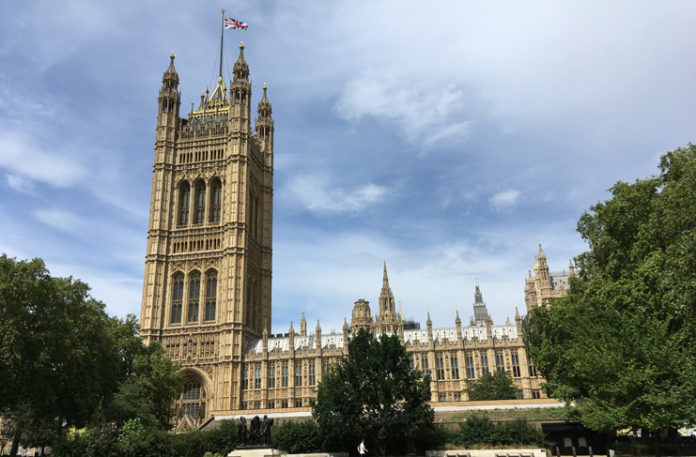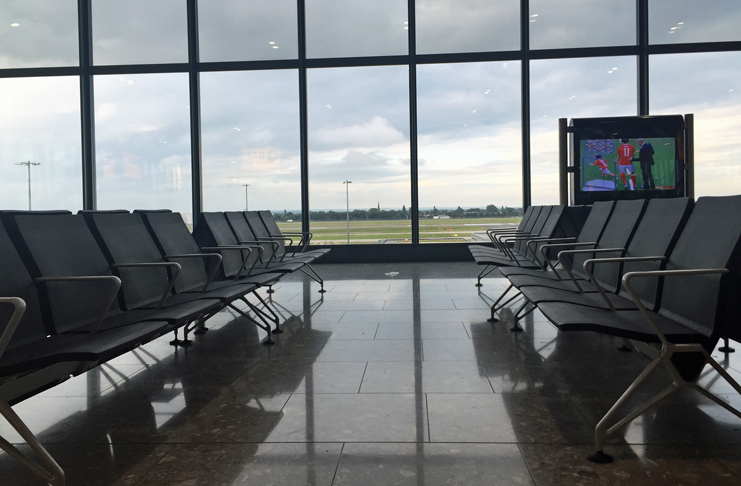
TravelingForMiles.com may receive commission from card issuers. Some or all of the card offers that appear on TravelingForMiles.com are from advertisers and may impact how and where card products appear on the site. TravelingForMiles.com does not include all card companies or all available card offers.
Some links to products and travel providers on this website will earn Traveling For Miles a commission that helps contribute to the running of the site. Traveling For Miles has partnered with CardRatings for our coverage of credit card products. Traveling For Miles and CardRatings may receive a commission from card issuers. Opinions, reviews, analyses & recommendations are the author’s alone and have not been reviewed, endorsed, or approved by any of these entities. For more details please see the disclosures found at the bottom of every page.
The UK government has now clarified a major talking point from this post – click here for more details.
Over the weekend, reports emerged in the UK press suggesting that the British government is considering making changes to its quarantine rules for travelers arriving from countries that are not on the UK’s “red list”. Assuming the reports are accurate (they probably are), there’s an excellent chance that the government is about to add to its ever-lengthening list of pandemic mistakes.
Background
Right now, England is under lockdown, which means that all non-essential travel is forbidden and it is illegal to travel abroad for leisure. England also has a ban in place on travel (of any kind) from 33 countries in, mainly, South America, southern Africa, and parts of the Middle East. These 33 countries make up England’s “red list”.
Travelers visiting the UK from destinations that are not on the UK’s red list must currently provide proof of a negative Covid test before they’re allowed to travel to the UK, and must then self-isolate at their home or in their hotel for a period of 10 days upon their arrival. They may use the UK’s ‘test to release’ program to end their self-isolation early by providing a negative Covid test after day 5.
Travelers visiting the UK from red list destinations (only legal residents of the UK are allowed to enter the UK if they’ve been in one or more of these countries in the 10 days leading up to travel) must currently provide proof of a negative Covid test before they’re allowed to travel to the UK and must then self-isolate at their home or in their hotel for a period of 10 days upon their arrival. They may not use the UK’s ‘test to release’ program to end their self-isolation early.
From 15 February, anyone arriving from a “red list” destination will be placed into government-supervised quarantine for a minimum of 10 days, will be given a Covid test after 2 days of quarantine, and will be given a further Covid test after 8 days of quarantine. There will be no scope for a visitor to be allowed out into the community early.
What Is Being Rumored
The press is a great source of information for anyone wanting to find out what the UK government is thinking because the government leaks like a sieve. Over the weekend, reports emerged that plans were being put forward to change the quarantine rules for people arriving from non red list countries.
The plan appears to be to scrap the ‘test to release’ program and to insist that new arrivals into England take Covid tests on days 2 and 8 of their 10-day self-isolation period (on top of the pre-departure test they already have to take) and to remove any possibility of early release. Potentially, that’s 3 Covid tests in 8 days.
Why This Is A Bad Idea
Towards the end of January, Israel took the decision to shut its one major international airport to all passenger traffic because infection rates in the country were rising rapidly. By the Israeli government’s own admission, the main reason infection rates were rising was that only around 33% of incoming passengers were abiding by the country’s quarantine rules. An estimated 67% of incoming passengers were breaking quarantine and going about their business as if nothing was the matter.
There’s no reason to believe that passengers entering the UK are significantly better behaved than those entering Israel, so it would seem fair to assume that at least 50% of passengers entering the UK aren’t taking any notice whatsoever of the UK’s quarantine rules. The fact that the UK authorities have been notoriously bad at policing their own rules would suggest that the figure of 50% is probably on the conservative side.
If we assume that a significant percentage of new arrivals into the UK are currently breaking quarantine rules when they have the option to leave quarantine on day 6, it’s logical to assume that when that option is removed and a 10-day unmonitored self-isolation period is introduced, the percentage of people ignoring the rules will increase.
The change of rules that the UK government is apparently considering is almost certainly going to make things worse. Fewer people will stick to the rules and that will mean more potentially infected people mixing with the population.
Related Reading: UK Government-Supervised Quarantine Is Coming On 15 February (It’s A Mess)
Why The Government Is Considering This
The problem we have is that the UK government is spineless and, as has been the case all through the pandemic, is incapable of making tough decisions at the time the tough decisions need to be taken. It’s why every lockdown has come too late, it’s why the summer quarantine on arrivals was too late, and it’s why we’re still waiting for the government-supervised quarantine to be introduced.
Now, the government appears to be hoping that it can avoid taking the tough decision to either enforce a supervised quarantine on all new arrivals or, if that’s not logistically possible, to close the borders, by trying to put people off from traveling to the UK. It’s hoping that by introducing a longer self-isolation period, people who may have otherwise traveled will now stay at home. The flaw with that idea is that it doesn’t take into account human nature.
A longer self-isolation period isn’t going to prevent the vast majority of people who wish to travel to the UK from traveling. It’s just going to make more of them ignore the self-isolation rules completely. The people most likely to be trustworthy enough to keep to a self-regulated quarantine of 10 days aren’t traveling right now anyway, so all the rumored rule change will do is result in more people taking the chance that the UK authorities won’t keep an eye on them. Which they won’t.
Yes, the government may be able to force new arrivals to take Covid tests on day 2 and day 8 of their visit, but it has no plan for making sure they’re not breaking the self-isolation rules in the meantime. More funds and resources aren’t being given to the border force or to the police to ensure that quarantine restrictions are being observed, so these people will go unmonitored.
Bottom Line
If there’s a genuine risk of incoming travelers importing new strains of the coronavirus into the UK, the government needs to grow a spine and either ban all international travel or put all new arrivals into supervised quarantine. There should be no half measures because half measures don’t work. We have the evidence of the past 10 months to prove that but for some unfathomable reason, this government never seems to learn.














![Earn 20,000 bonus Amex points on Air France/KLM bookings [Targeted] a row of seats in a plane](https://travelingformiles.com/wp-content/uploads/2024/03/air-france-new-business-class-2-741-80x60.jpg)


What I don’t understand is why travel is being singled out as the corresponding one to one cause of a country’s rise in cases.
If there is negative testing coming then it already stands to reason that a large majority of arrivals are indeed negative. Yes they may miss a few, but assuming your rate of 50% compliance, that still makes only a small number of people who are both covid positive, asymptomatic and who break quarantine.
Now what is more likely, that small group of individuals being responsible for a case surge? Or more likely irresponsible home citizens flouting stay at home orders? I would bet the latter.
People broke the rules in Israel because there was no way to test out of it, so they do not see it as fair.
I’m sure those breaking UK quarantine try to use the same excuse. The fact is that fairness shouldn’t come into it. What is and isn’t fair in a pandemic is not an individual persons decision to make. In fact, “it isn’t fair” is the standard excuse of the typical selfish, self-centered, idiot.
You pass draconian rules, there will always be those who will not obey. Even clamping down with complete bans on incoming flights and clamping everyone with RFID ankle bracelets will see people still finding ways to disobey.
So, disobedience is a given. It is like an absolute value that must always be factored in.
None of the lockdowns/curfews/bans/etc. has stopped the virus. Some factor, call it X, is always going to be responsible for the continued spread.
Vaccines aren’t any sort of answer; vaccinated people can still test positive and can still spread the virus.
The only thing we can control is the misery of living with this virus. The more draconian the rules, the greater the misery: businesses insolvent, depression, suicides, more crime, etc.
The UK is in denial: the virus is already in the country and one way or another, the X variable, it will spread. It should be independent of politics, but masks and obedience have become politicized by certain factions of people; this also motivates people aligned with other factions to disobey rules. You may hate them, but you cannot stop them. Stronger rules will meet with stronger resistance.
We can control how long we ‘live with the pandemic’ and we can control to what extent it permanently changes our societies. If we limit the spread to just a few hundred new ‘cases’ per day, and considering that this virus is likely going to be endemic, you start down a road that stretches for decades and decades and includes curfews, government monitoring, government permission for travel of any kind, AI employed to track people’s movements, drone-based enforcement, and greater efforts to monitor every aspect of people’s lives, all in the name of safety from our ever-present bogeyman.
The further we go on this road, the more it becomes the only way ‘forward’. The whole concept of freedom is redefined, and anyone who expresses a desire for true freedom is branded as dangerous, no longer allowed freedom of speech, and ‘deplatformed’ on social media.
The Chinese are a patient people. They have always been willing to sacrifice pleasures in the present for a greater outcome in the future. They also know that western societies are just the opposite: unwilling in general to sacrifice anything in the present and rarely even thinking about the future.
The response to this virus has therefore been predictable. We are unwilling to live with short-term pain to secure a longer-term good. If we can enhance the security of just one person immediately at the possible cost of destroying the quality of life of millions of people in the future, including those yet to be born, given our lack of a sense of proportion, borne of denial, and our characteristic perspective, our response will be (and has been) predictable. The “Karens” who control our cultural high ground (rightfully or otherwise) lock us all in a box by making actual debate over our way (forward? out?) in the face of this pandemic in fact non-negotiable, on pain of, for instance, loss of livelihood.
But if the Karens are wrong, and the Karens control who is allowed to speak, who can step up and tell them that their emperor has no clothes?
[…] the ‘test to release’ scheme as was rumored by various media outlets over the weekend. As I pointed out yesterday, removing the option for visitors from non red list countries to end self-isolation early would […]